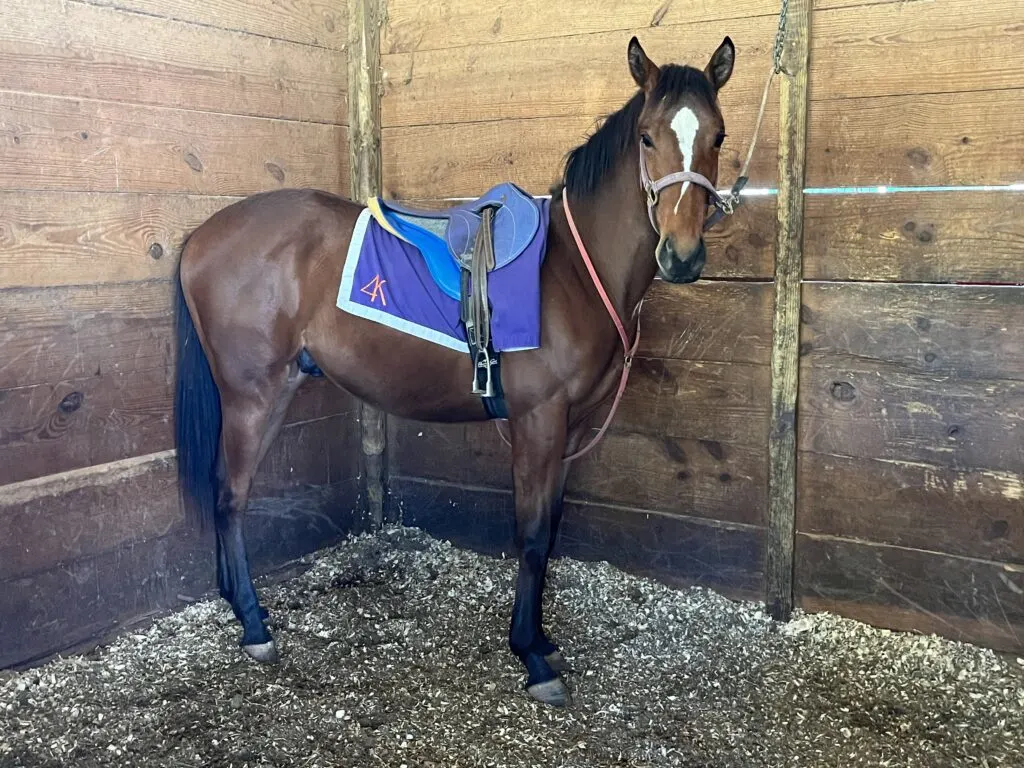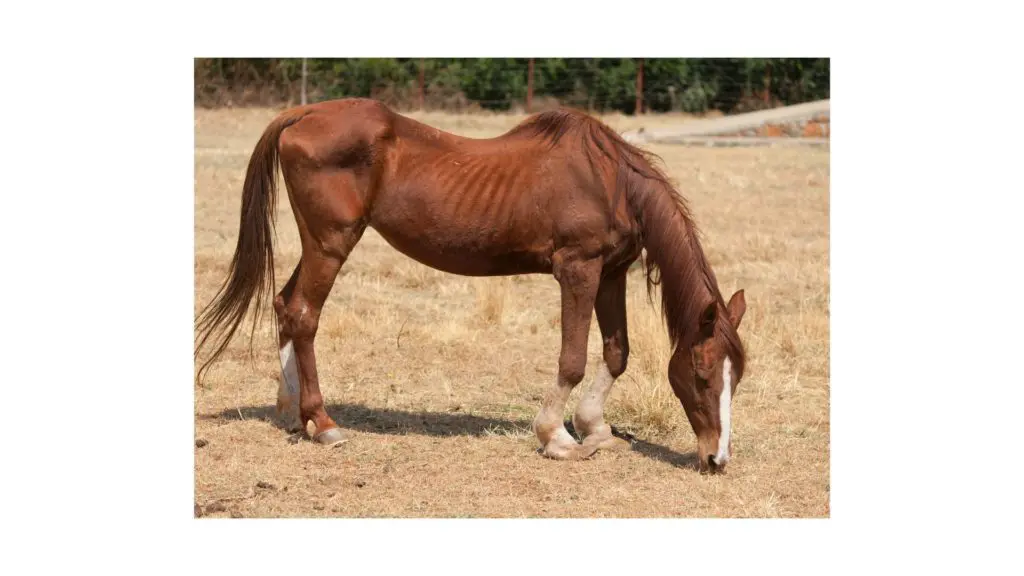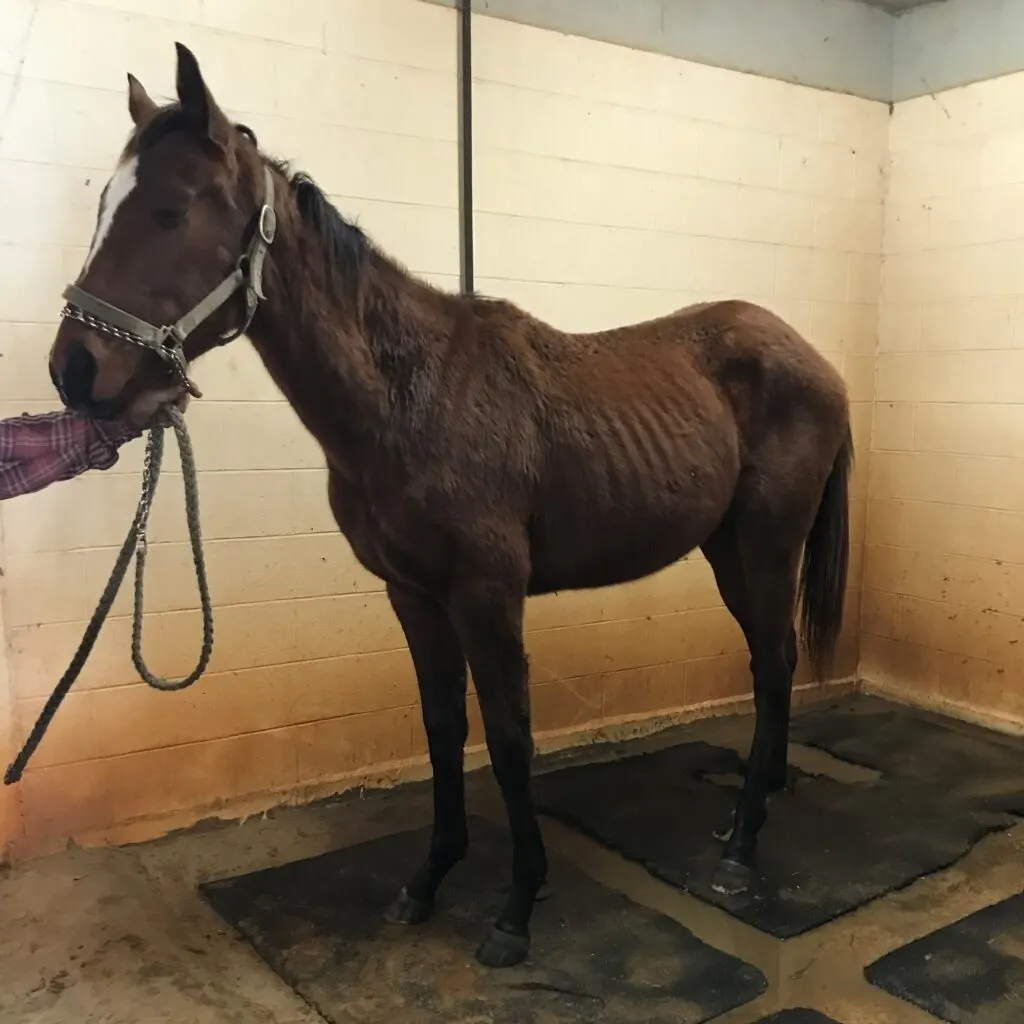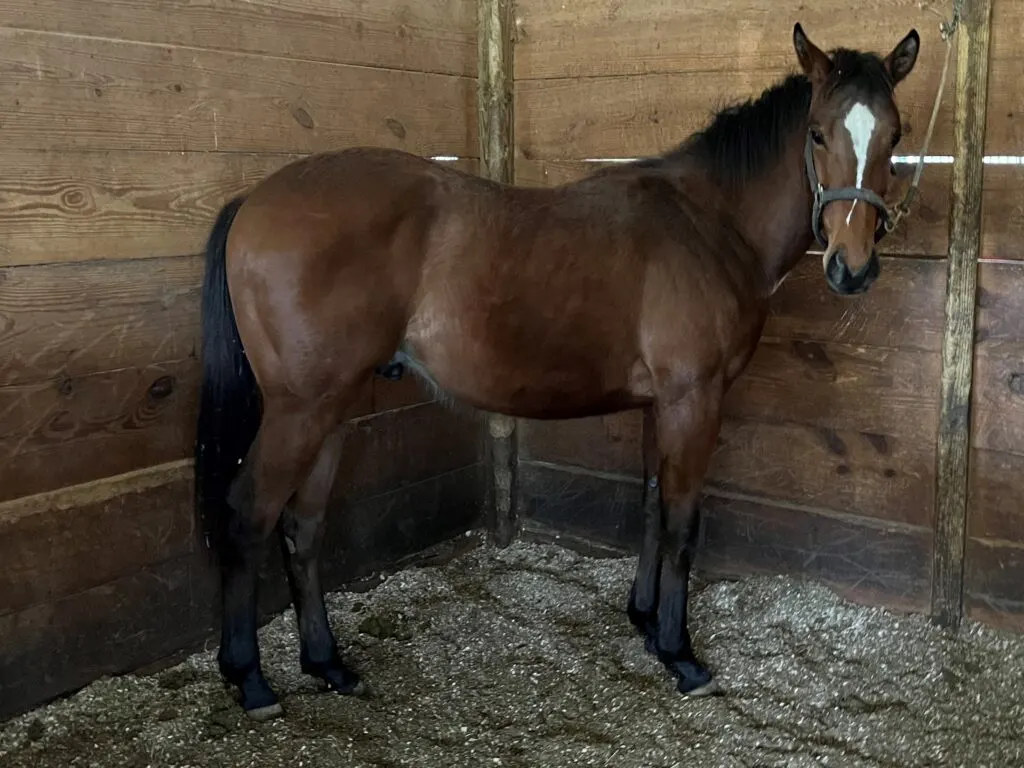Last updated: May 27, 2022
Any links on this page that lead to products on Amazon are affiliate links and I earn a commission if you make a purchase. Thanks in advance – I really appreciate it!
I was worming our horses recently when my granddaughter walked into the barn. As she patiently watched me squirting paste in the horse’s mouths, she asked me how she can tell when her horse needs worming?
Common signs a horse needs worming are weight loss, diarrhea, fatigue, itchy rear-end, and an off-color or unhealthy coat. However, the best horse worming practice is not to wait for signs but rather to have an effective deworming strategy.
Most horse owners know worms cause severe health issues for their animals. But there are important considerations before you start a deworming routine for your horse.
The type of worms and the severity of the infestation determines the signs and symptoms your horse displays when infected by parasitic worms.


I bought the horse pictured above and besides being underfed, I suspected he had worms, so I started him on a deworming program, adjusted his diet, and began exercising him.
The picture on the right is the same horse about four months later, and below is a picture of him six months later. With patience and care, our horse reached a healthy weight. (I have some additional before and after pics towards the end of this article.)

Signs of worm infection.
Worms are a common problem for horse owners. They often cause a horse to lose weight, have a poor appetite, and be lethargic. In severe cases, horse owners may also notice blood in their horse’s stool.
While there are many effective worming products on the market, the best way to prevent worms is to practice good hygiene and maintain a clean stable. It’s also important to regularly check your horse for signs of worms and have them examined by a veterinarian if you suspect they may have a problem.
Here is a list of signs a horse may be infected with worms:
- Diarrhea
- Loss of hair around its tail from rubbing
- Not eating normally
- Losing weight
- Lack of energy, sluggish
- Anemia
- Colic
- Impaction
- Dull and unhealthy looking coat
- Sores on your horses’ skin
Type of worms your horse may get.
Several internal parasites infect horses, and each causes different symptoms. Here is a list of the most common worms, along with the symptoms they cause:

1. Large strongyles
Large Strongyles are blood-feeding worms that are the source of a multitude of health issues. They are so dangerous because they typically take six months for a Large Strongyle worm to cycle through a horse’s digestive tract.
Large strongyles are dangerous parasites; as they move through a horse’s digestive tract, they ingest blood, resulting in anemia. They can accumulate and block arteries, transmit viruses, and cause weakness, weight loss, colic, and diarrhea.
2. Small strongyles
Small strongyles are also dangerous parasites that develop in the wall of the host intestine. Horses eat the larvae of small strongyles while grazing in infected pastures.
Once the larvae are in the horse, they attach to the large intestine wall and the cecum, a pouch that forms the first part of the large intestine.
When the small strongyles reach their resting spot, they develop a protective coating where they can remain for up to three years. When in this state, they are immune to most worming medications.
During optimal conditions, the larvae emerge from their protective armor and develop into adult worms, and begin laying eggs, and the cycle begins anew. These parasites feed on the gut lining and material in the large intestine.
Often large numbers of small strongyles emerge simultaneously and cause severe damage such as diarrhea, colic, or even death. Small strongyles are also called cyathostomins and small redworms.
3. Large Roundworms (Ascarids)
Large roundworms are most prevalent in young horses under two years old. They can take up to four months to migrate through a horse and travels in the animals’ bloodstream.
The larvae are picked up during grazing and quickly penetrate the digestive tract and enter the bloodstream. They pass through the liver and lungs before hibernating in the horse’s gut as an adult worm.
Infected horses often display respiratory symptoms, such as coughing, lung damage, poor development, and sometimes colic and death. Large roundworm eggs can survive in a foal from one season to the next because ascarid eggs can be viable inside an animal for years.
4. Pinworms
Pinworms can grow up to four inches long and are the culprit that causes your horse to rub its rear end continuously. The itching is caused by female pinworms laying eggs outside of the anus in the gelatinous substance.
A significant problem with controlling these parasites is that stabled horses often rub their backside against feed bins. The result is the pinworms fall into the feed and is taken back in when the animal eats.
Pinworms cause itchiness, hair loss, and wounds at the tail base from the horse seeking relief by rubbing its tail area.
5. Tapeworms
There are a few different tapeworm species; however, Anoplocephala perfoliata is the most harmful and can cause impaction colic. They are typically around 10 inches long and are found in the small intestine and stomach.
Tapeworms have to have a mite host. The mite eats the tapeworm egg from a horse’s manure, and then the horse eats the mite while grazing. Once in the horse’s digestive tract, the tapeworms attach to the gut’s inner lining.
Symptoms of infection caused by tapeworms are weight loss, anemia, ulcers, and colic.

6. Stomach bots
Botflies are aggravating insects both outside and inside your horse. They lay eggs on animals that are ingested and develop into larvae in the horse’s mouth.
These larvae damage the animal’s mouth and tongue before traveling to their stomach and causing more damage. They typically attach to the gut lining and can cause stomach ulcers, lesions, and colic.
Signs of worm infestations are incredibly variable; they can be subtle or quite severe and depend on the worm type and extent.
- Ivermectin Paste 1.87% Anthelmintic & Boticide Removes worms and bots with a single dose (6.08 g)
- apple flavored
- free Prime shipping.
Prices pulled from the Amazon Product Advertising API on:
Product prices and availability are accurate as of the date/time indicated and are subject to change. Any price and availability information displayed on [relevant Amazon Site(s), as applicable] at the time of purchase will apply to the purchase of this product.
How often should you worm your horse?
Typically we worm our horses every other month and rotate the types of wormer we use. However, this is good for our horses, but it may not be right for your horse.
The most accurate way to determine how often your horse needs to be wormed is with a fecal egg count reduction test performed by your vet. Follow the vets’ recommendation, and you will likely be more effective and save money on wasted treatments.
Horses are individuals, and you need to tailor your deworming schedule to fit your horse’s condition and situation. For example, age makes a difference.

Young horses and older horses are more susceptible to worm infestation and may need more frequent treatment than adult horses in the prime of their life.
The number of horses you keep together, the climate, and the frequency of exposure to other animals are all considerations on how often your horses need deworming.
Healthy horses naturally tolerate or resist the ill effects caused by worms and require less frequent worming treatments than unhealthy horses. To confirm your deworming program is working, have a fecal exam performed.
It takes time for your worming medication to complete its job, so the fecal test should be done after an appropriate time has passed. It typically takes two to three days for Ivermectin and some other deworming medications to expel worms.
Vary the type of dewormer you use.
There are a few reasons to rotate dewormer medications. The two primary purposes are that parasites develop an immunity to drugs, and different worming medications are designed for specific types of parasites.
- Merck Animal Health
- Perfect for general parasite control in rotational deworming
- 10 fenbendazole paste formula in a 25 gram paste tube
- Has great apple cinnamon taste that ensures less waste
- Is effective against large strongyles small strongyles pinworms and ascarids
Prices pulled from the Amazon Product Advertising API on:
Product prices and availability are accurate as of the date/time indicated and are subject to change. Any price and availability information displayed on [relevant Amazon Site(s), as applicable] at the time of purchase will apply to the purchase of this product.
For example, Ivermectin and moxidectin are used to control strongyle parasites. And pyrantel, fenbendazole, and oxibendazole are effective in treating ascarids in young horses.
By rotating deworming medications, you reduce the chances that the parasites build resistance. Remember, it’s not just about changing brands, but about changing the active ingredients.
It’s also critical to be aware of seasonal worms and the drugs used for their control. As much as we would like, there is no worming protocol that completely rids animals of worms, but a good plan reduces parasite infections so horses can remain healthy, and they don’t develop symptoms.
After you worm your horse, leave it isolated for a couple of days. The animal will expel the drug and worms in its manure. Some of this is toxic to other animals, especially certain dog breeds.
How do horses get worms?
As we know, horses are susceptible to a variety of worms, including strongyles, bots, and tapeworms and these parasites can cause diarrhea, weight loss, and anemia in horses. Worms are acquired by horses in a number of ways.
They can ingest the parasites while grazing on contaminated grass or soil. They can also contract them from drinking contaminated water. In addition, horseflies and other insects can transmit worms to horses when they bite.
To help prevent the spread of worms, horse owners should practice good sanitation measures, such as regularly cleaning stalls and pastures. In addition, horse owners should have their animals dewormed on a regular basis.
Here is the cliff note version of the worm/horse cycle: Worms start as eggs, grow into immature worms called larvae, and finally become mature or adult worms.
Eggs and larvae are passed in the manure of infected horses and spread in grass. Horses swallow the larvae when grazing, and the cycle begins once again.
The larvae mature in the horse’s digestive tract or other organs and wreak havoc on the animal’s immunity and damage the horse’s ability to convert food into useful nutrients.
Sometimes the damage caused to a host is permanent and critical. Young horses and older horses with decreased immunity are at high risk of damage from worms.
Below are before and after pictures of a horse. You can tell from the first picture he displayed classic signs of having worms. The second picture is a few months after he was fed correctly and started on a worming program.


Steps you can take to help control worm infestation.
First, establish an effective deworming program for your horse. Next, reduce worm contamination. These are the steps you can take to lower your horse’s exposure to parasitic worms:
- Pasture maintenance: Spray your pastures for insects, and keep the grass cut. This keeps the field drier but also busts up manure piles where the larvae live.
- When you muck out stalls, haul the manure to a location not accessible to your horses.
- Raise the feed bucket above the height of your horse’s tail to prevent it from rubbing its butt.
- If possible, rotate the pastures and turnout paddocks you use for your horses.
- Separate contaminated horses
| Brand | Price | Prime | Buy | |
|---|---|---|---|---|
 Top
Top | Farnam IverCare (ivermectin paste) 1.87%, Dewormer Paste, Treats Horses Up to 1,500 pounds, 0.26 oz | PrimeEligible | Buy Now | |
 Top
Top | Durvet Ivermectin Paste Dewormer - 6.08g dose @ 1.87% Apple Flavor (6-Pack) | PrimeEligible | Buy Now | |
| PANACUR Dewormer HORSE PASTE 10%, 100mg | PrimeEligible | Buy Now | ||
 | Safeguard Horse Dewormer - 25 Gm | PrimeEligible | Buy Now | |
 | Zimectrin Paste Dewormer 1Dose | PrimeEligible | Buy Now |
Conclusion
You will not eliminate worms, but by setting up a good program and sticking with it, you can control parasites.
Recently I ran across a site that sells dewormers, horsefly sprays, shampoos, and other products at reasonable prices, so I thought I would share it with you; click here to check it out.
Below is an informative YouTube video about worms in horses.
FAQ
Do worms cause a horse to lose hair?
Yes, some worm infestation causes hair loss, particularly roundworms (nematodes). You can read more about equine hair loss in this article: Why Is My Horse Losing Hair? Big Patches Are Coming Off!
How do I keep my horse from getting worms?
1. Have a proper manure control program for your barn and pasture.
2. Don’t overstock pastures
3. Have each horse on a worming schedule.
4. If possible, cross graze your pasture with cattle or goats
Can humans get worms from horses?
It’s possible for people to contract worms, but these come exclusively from other humans, not horses or any other animals.

